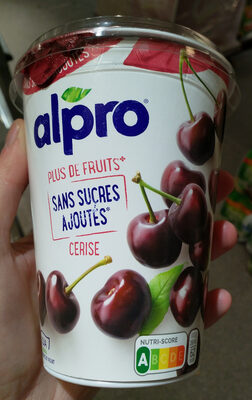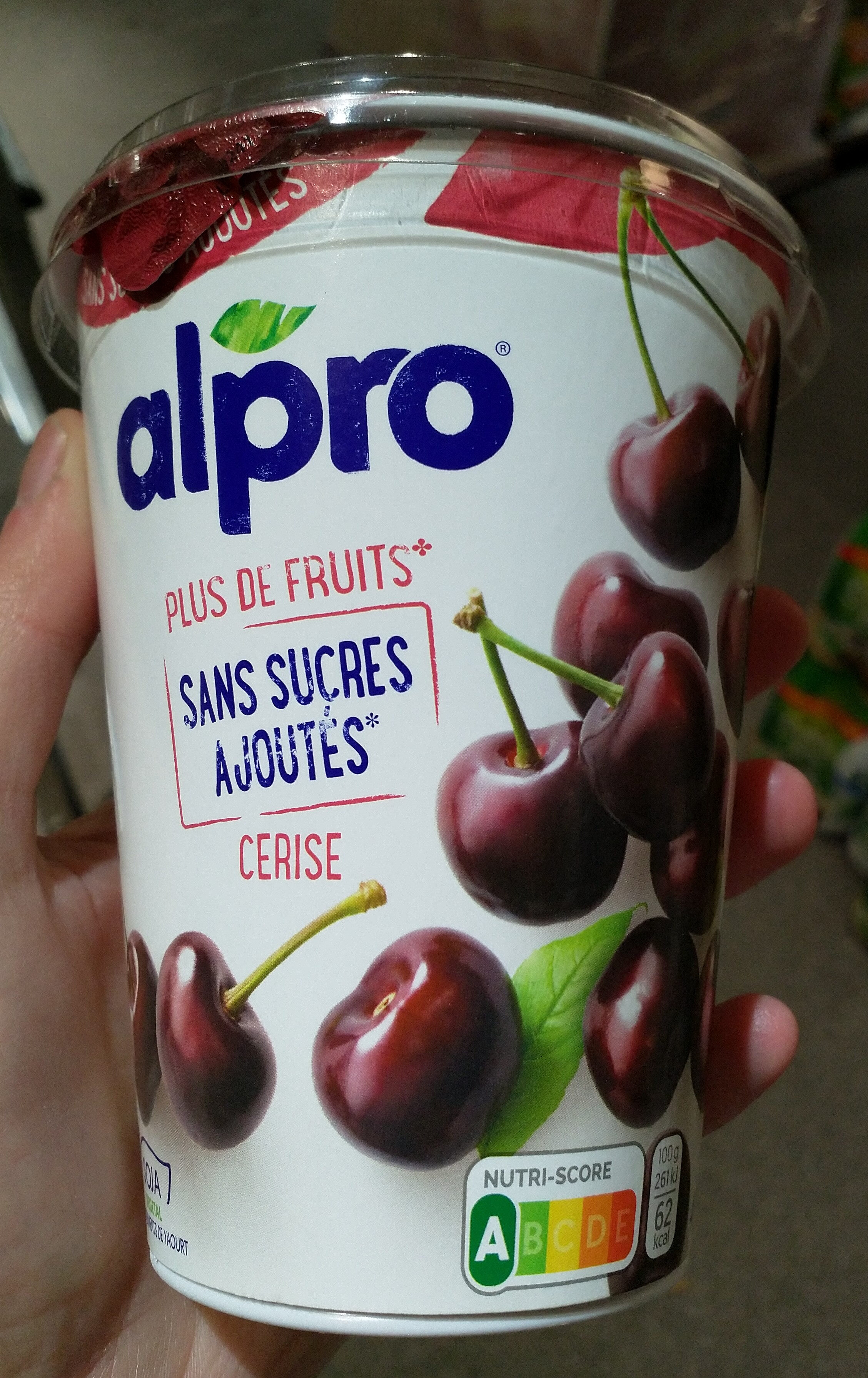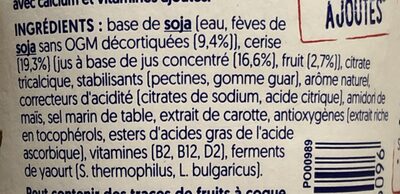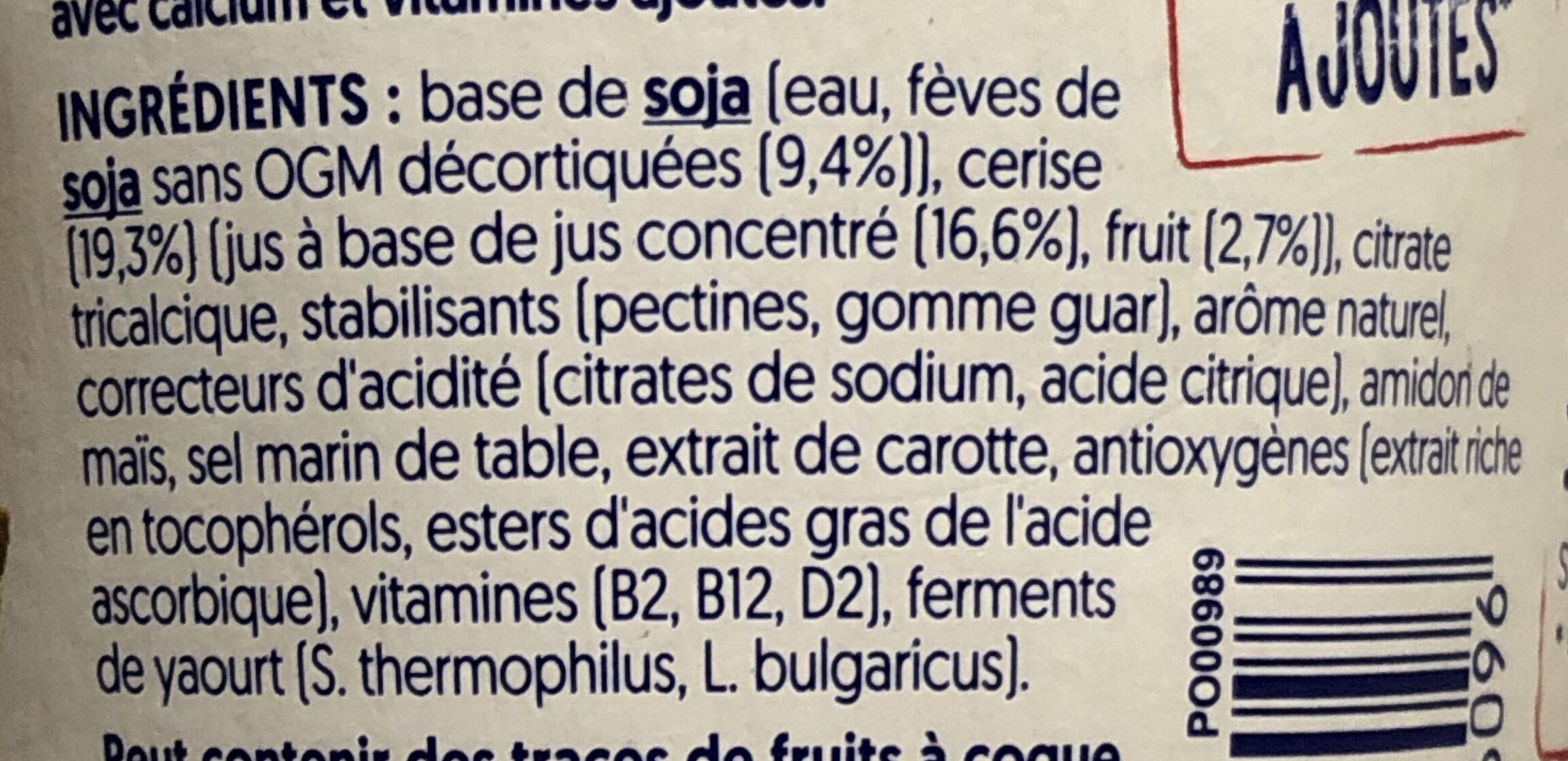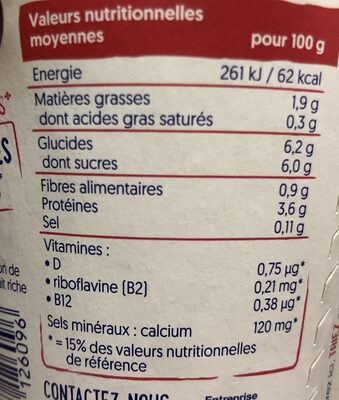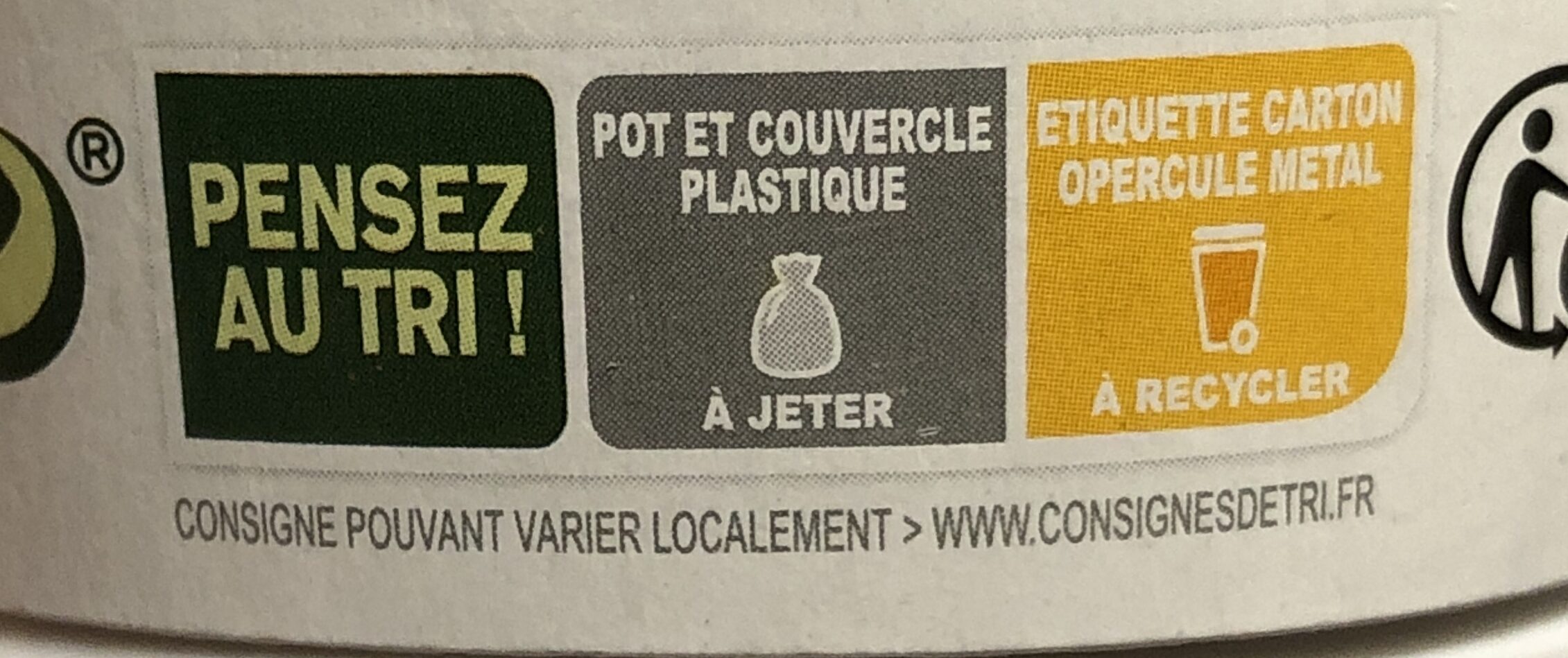Help us make food transparency the norm!
As a non-profit organization, we depend on your donations to continue informing consumers around the world about what they eat.
The food revolution starts with you!
Alpro Cerise Sans Sucres Ajoutés - 400 g
Alpro Cerise Sans Sucres Ajoutés - 400 g
This product page is not complete. You can help to complete it by editing it and adding more data from the photos we have, or by taking more photos using the app for Android or iPhone/iPad. Thank you!
×
Barra-kodea: 5411188126096 (EAN / EAN-13)
Izen arrunta: Produit fermenté au soja, cerise, aromatisé, avec calcium et vitamines ajoutés
Kopurua: 400 g
Ontziratzea: en:Plastic, en:pp-polypropylene, fr:Etiquette carton à recycler, fr:Opercule en métal, fr:Point vert, fr:Pot et couvercle plastique - opercule aluminium à jeter, fr:Triman
Markak: Alpro
Kategoriak: en:Plant-based foods and beverages, en:Fermented foods, en:Dairy substitutes, en:Desserts, en:Non-dairy desserts, en:Non-dairy fermented foods, en:Non-dairy yogurts, en:Soy milk yogurts, en:Fruit soy yogurts, en:Soy desserts
Etiketak, ziurtagiriak, sariak:
en:No gluten, en:Vegetarian, en:No GMOs, en:Vegan, Calcium source, en:Certified B Corporation, en:European Vegetarian Union, en:European Vegetarian Union Vegan, en:Green Dot, No added sugar, en:No lactose, Nutriscore, Nutriscore A, Triman, en:No-sweeteners, en:Only-sugar-from-fruit



Link to the product page on the official site of the producer: https://www.alpro.com/fr/produits/altern...
Dendak: Marktkauf, Delhaize, Leclerc, Carrefour
Saltzen diren herrialdeak: Belgika, Frantzia, Alemania, Espainia
Matching with your preferences
Health
Osagaiak
-
27 ingredients
Frantses: Base de soja (eau, fèves de soja sans OGM décortiquées 9.4%), cerise 19.3% (jus à base de concentré 16.6%, fruit 2.7%), citrate tricalcique, stabilisants (pectines, gomme guar), arôme naturel, correcteurs d'acidité (citrates de sodium, acide citrique), amidon de maïs, sel marin de table, extrait de carotte, antioxydants (extrait riche en tocophérols, esters d'acides gras de l'acide ascorbique), vitamines (B2, B12, D2), ferments de yaourt (S. thermophilus, L. bulgaricus)Alergenoak: en:Milk, en:Nuts, en:SoybeansAztarnak: en:Nuts
Food processing
-
Ultra processed foods
Elements that indicate the product is in the 4 - Ultra prozesatutako elikagaiak eta edariak group:
- Gehigarria: E412
- Gehigarria: E440 - Pektina
- Osagaia: Flavouring
Food products are classified into 4 groups according to their degree of processing:
- Prozesatu gabeko edo ahalik eta gutxien prozesatutako elikagaiak
- Sukaldaritzako osagaiak prozesatu
- Prozesatutako jakiak
- Ultra processed foods
The determination of the group is based on the category of the product and on the ingredients it contains.
Gehigarriak
-
E304
Ascorbyl palmitate: Ascorbyl palmitate is an ester formed from ascorbic acid and palmitic acid creating a fat-soluble form of vitamin C. In addition to its use as a source of vitamin C, it is also used as an antioxidant food additive -E number E304-. It is approved for use as a food additive in the EU, the U.S., Canada, Australia, and New Zealand.Ascorbyl palmitate is known to be broken down -through the digestive process- into ascorbic acid and palmitic acid -a saturated fatty acid- before being absorbed into the bloodstream. Ascorbyl palmitate is also marketed as "vitamin C ester".Source: Wikipedia (Ingeles)
-
E330 - Azido zitriko
Citric acid: Citric acid is a weak organic acid that has the chemical formula C6H8O7. It occurs naturally in citrus fruits. In biochemistry, it is an intermediate in the citric acid cycle, which occurs in the metabolism of all aerobic organisms. More than a million tons of citric acid are manufactured every year. It is used widely as an acidifier, as a flavoring and chelating agent.A citrate is a derivative of citric acid; that is, the salts, esters, and the polyatomic anion found in solution. An example of the former, a salt is trisodium citrate; an ester is triethyl citrate. When part of a salt, the formula of the citrate ion is written as C6H5O3−7 or C3H5O-COO-3−3.Source: Wikipedia (Ingeles)
-
E331
Sodium citrate: Sodium citrate may refer to any of the sodium salts of citrate -though most commonly the third-: Monosodium citrate Disodium citrate Trisodium citrateThe three forms of the salt are collectively known by the E number E331. Sodium citrates are used as acidity regulators in food and drinks, and also as emulsifiers for oils. They enable cheeses to melt without becoming greasy.Source: Wikipedia (Ingeles)
-
E333
Calcium citrate: Calcium citrate is the calcium salt of citric acid. It is commonly used as a food additive -E333-, usually as a preservative, but sometimes for flavor. In this sense, it is similar to sodium citrate. Calcium citrate is also found in some dietary calcium supplements -e.g. Citracal-. Calcium makes up 24.1% of calcium citrate -anhydrous- and 21.1% of calcium citrate -tetrahydrate- by mass. The tetrahydrate occurs in nature as the mineral Earlandite.Source: Wikipedia (Ingeles)
-
E333iii
Calcium citrate: Calcium citrate is the calcium salt of citric acid. It is commonly used as a food additive -E333-, usually as a preservative, but sometimes for flavor. In this sense, it is similar to sodium citrate. Calcium citrate is also found in some dietary calcium supplements -e.g. Citracal-. Calcium makes up 24.1% of calcium citrate -anhydrous- and 21.1% of calcium citrate -tetrahydrate- by mass. The tetrahydrate occurs in nature as the mineral Earlandite.Source: Wikipedia (Ingeles)
-
E412
Guar gum: Guar gum, also called guaran, is a galactomannan polysaccharide extracted from guar beans that has thickening and stabilizing properties useful in the food, feed and industrial applications. The guar seeds are mechanically dehusked, hydrated, milled and screened according to application. It is typically produced as a free-flowing, off-white powder.Source: Wikipedia (Ingeles)
-
E440 - Pektina
Pectin: Pectin -from Ancient Greek: πηκτικός pēktikós, "congealed, curdled"- is a structural heteropolysaccharide contained in the primary cell walls of terrestrial plants. It was first isolated and described in 1825 by Henri Braconnot. It is produced commercially as a white to light brown powder, mainly extracted from citrus fruits, and is used in food as a gelling agent, particularly in jams and jellies. It is also used in dessert fillings, medicines, sweets, as a stabilizer in fruit juices and milk drinks, and as a source of dietary fiber.Source: Wikipedia (Ingeles)
Ingredients analysis
-
en:May contain palm oil
Ingredients that may contain palm oil: E304
-
en:Vegan
No non-vegan ingredients
Unrecognized ingredients: fr:base-de-soja, KobalaminaSome ingredients could not be recognized.
We need your help!
You can help us recognize more ingredients and better analyze the list of ingredients for this product and others:
- Edit this product page to correct spelling mistakes in the ingredients list, and/or to remove ingredients in other languages and sentences that are not related to the ingredients.
- Add new entries, synonyms or translations to our multilingual lists of ingredients, ingredient processing methods, and labels.
If you would like to help, join the #ingredients channel on our Slack discussion space and/or learn about ingredients analysis on our wiki. Thank you!
-
en:Vegetarian
No non-vegetarian ingredients detected
Unrecognized ingredients: fr:base-de-soja, KobalaminaSome ingredients could not be recognized.
We need your help!
You can help us recognize more ingredients and better analyze the list of ingredients for this product and others:
- Edit this product page to correct spelling mistakes in the ingredients list, and/or to remove ingredients in other languages and sentences that are not related to the ingredients.
- Add new entries, synonyms or translations to our multilingual lists of ingredients, ingredient processing methods, and labels.
If you would like to help, join the #ingredients channel on our Slack discussion space and/or learn about ingredients analysis on our wiki. Thank you!
-
Details of the analysis of the ingredients
We need your help!
Some ingredients could not be recognized.
We need your help!
You can help us recognize more ingredients and better analyze the list of ingredients for this product and others:
- Edit this product page to correct spelling mistakes in the ingredients list, and/or to remove ingredients in other languages and sentences that are not related to the ingredients.
- Add new entries, synonyms or translations to our multilingual lists of ingredients, ingredient processing methods, and labels.
If you would like to help, join the #ingredients channel on our Slack discussion space and/or learn about ingredients analysis on our wiki. Thank you!
fr: Base de _soja_ (eau, fèves de _soja_ sans OGM décortiquées 9.4%), cerise 19.3% (jus 16.6%, fruit 2.7%), citrate tricalcique, stabilisants (pectines, gomme guar), arôme naturel, correcteurs d'acidité (citrates de sodium, acide citrique), amidon de maïs, sel marin de table, extrait de carotte, antioxydants (extrait riche en tocophérols, esters d'acides gras de l'acide ascorbique), vitamines, vitamine B2, vitamine B12, vitamine D2, ferments de yaourt (streptococcus thermophilus, lactobacillus bulgaricus)- Base de _soja_ -> fr:base-de-soja
- eau -> en:water - vegan: yes - vegetarian: yes - ciqual_food_code: 18066
- fèves de _soja_ sans OGM décortiquées -> en:gmo-free-hulled-soya-bean - vegan: yes - vegetarian: yes - ciqual_food_code: 20901 - percent: 9.4
- cerise -> en:cherry - vegan: yes - vegetarian: yes - ciqual_food_code: 13008 - percent: 19.3
- jus -> en:juice - vegan: maybe - vegetarian: maybe - percent: 16.6
- fruit -> en:fruit - vegan: yes - vegetarian: yes - percent: 2.7
- citrate tricalcique -> en:e333 - vegan: yes - vegetarian: yes
- stabilisants -> en:stabiliser
- pectines -> en:e440a - vegan: yes - vegetarian: yes
- gomme guar -> en:e412 - vegan: yes - vegetarian: yes
- arôme naturel -> en:natural-flavouring - vegan: maybe - vegetarian: maybe
- correcteurs d'acidité -> en:acidity-regulator
- citrates de sodium -> en:e331 - vegan: yes - vegetarian: yes
- acide citrique -> en:e330 - vegan: yes - vegetarian: yes
- amidon de maïs -> en:corn-starch - vegan: yes - vegetarian: yes - ciqual_food_code: 9510
- sel marin de table -> en:sea-salt - vegan: yes - vegetarian: yes - ciqual_food_code: 11082
- extrait de carotte -> en:carrot-extract - vegan: yes - vegetarian: yes - ciqual_food_code: 20009
- antioxydants -> en:antioxidant
- extrait riche en tocophérols -> en:e306 - vegan: yes - vegetarian: yes
- esters d'acides gras de l'acide ascorbique -> en:e304 - vegan: maybe - vegetarian: maybe - from_palm_oil: maybe
- vitamines -> en:vitamins - vegan: yes - vegetarian: yes
- vitamine B2 -> en:e101 - vegan: maybe - vegetarian: yes
- vitamine B12 -> en:vitamin-b12
- vitamine D2 -> en:ergocalciferol - vegan: yes - vegetarian: yes
- ferments de yaourt -> en:yogurt-cultures - vegan: maybe - vegetarian: yes
- streptococcus thermophilus -> en:streptococcus-thermophilus - vegan: maybe - vegetarian: yes
- lactobacillus bulgaricus -> en:lactobacillus-bulgaricus - vegan: maybe - vegetarian: yes
Elikadura
-
Nutrizio-kalitate oso ona
⚠ ️Warning: the amount of fruits, vegetables and nuts is not specified on the label, it was estimated from the list of ingredients: 28This product is not considered a beverage for the calculation of the Nutri-Score.
Positive points: 2
- Proteinak: 2 / 5 (balioa: 3.6, rounded value: 3.6)
- Fiber: 0 / 5 (balioa: 0.9, rounded value: 0.9)
- Fruits, vegetables, nuts, and colza/walnut/olive oils: 0 / 5 (balioa: 28.93984375, rounded value: 28.9)
Negative points: 1
- Energia: 0 / 10 (balioa: 261, rounded value: 261)
- Azukreak: 1 / 10 (balioa: 6, rounded value: 6)
- Gantz saturatua: 0 / 10 (balioa: 0.3, rounded value: 0.3)
- Sodioa: 0 / 10 (balioa: 44, rounded value: 44)
The points for proteins are counted because the negative points are less than 11.
Nutritional score: (1 - 2)
Nutri-Score:
-
Nutrient levels
-
Koipe in low quantity (1.9%)
What you need to know- A high consumption of fat, especially saturated fats, can raise cholesterol, which increases the risk of heart diseases.
Recommendation: Limit the consumption of fat and saturated fat- Choose products with lower fat and saturated fat content.
-
Gantz-azido ase in low quantity (0.3%)
What you need to know- A high consumption of fat, especially saturated fats, can raise cholesterol, which increases the risk of heart diseases.
Recommendation: Limit the consumption of fat and saturated fat- Choose products with lower fat and saturated fat content.
-
Azukre in moderate quantity (6%)
What you need to know- A high consumption of sugar can cause weight gain and tooth decay. It also augments the risk of type 2 diabetes and cardio-vascular diseases.
Recommendation: Limit the consumption of sugar and sugary drinks- Sugary drinks (such as sodas, fruit beverages, and fruit juices and nectars) should be limited as much as possible (no more than 1 glass a day).
- Choose products with lower sugar content and reduce the consumption of products with added sugars.
-
Gatz arrunt in low quantity (0.11%)
What you need to know- A high consumption of salt (or sodium) can cause raised blood pressure, which can increase the risk of heart disease and stroke.
- Many people who have high blood pressure do not know it, as there are often no symptoms.
- Most people consume too much salt (on average 9 to 12 grams per day), around twice the recommended maximum level of intake.
Recommendation: Limit the consumption of salt and salted food- Reduce the quantity of salt used when cooking, and don't salt again at the table.
- Limit the consumption of salty snacks and choose products with lower salt content.
-
-
Nutrition facts
Nutrition facts As sold
for 100 g / 100 mlCompared to: en:Fruit soy yogurts Energia 261 kj
(62 kcal)-% 20 Koipe 1,9 g -% 5 Gantz-azido ase 0,3 g -% 4 Carbohydrates 6,2 g -% 43 Azukre 6 g -% 40 Fiber 0,9 g +% 1 Proteina 3,6 g - Gatz arrunt 0,11 g +% 17 D bitamina 0,75 µg -% 22 Vitamin B2 (Riboflavin) 0,21 mg Vitamin B12 (cobalamin) 0,38 µg -% 77 Kaltzio 120 mg -% 3 Fruits‚ vegetables‚ nuts and rapeseed‚ walnut and olive oils (estimate from ingredients list analysis) 28,94 %
Ingurumena
-
Eco-Score B - Ingurumen-eragin txikia
The Eco-Score is an experimental score that summarizes the environmental impacts of food products.→ The Eco-Score was initially developped for France and it is being extended to other European countries. The Eco-Score formula is subject to change as it is regularly improved to make it more precise and better suited to each country.Life cycle analysis
-
Average impact of products of the same category: A (Score: 97/100)
Kategoria: Soy dessert, plain, refrigerated
Kategoria: Soy dessert, plain, refrigerated
- PEF environmental score: 0.10 (the lower the score, the lower the impact)
- including impact on climate change: 0.82 kg CO2 eq/kg of product
Stage Impact Agriculture
19.6 %Processing
37.2 %Ontziratzea
15.3 %Transportation
16.6 %Distribution
8.9 %Consumption
2.4 %
Bonuses and maluses
-
Missing origins of ingredients information
Malus: -5
⚠ ️ The origins of the ingredients of this product are not indicated.
If they are indicated on the packaging, you can modify the product sheet and add them.
If you are the manufacturer of this product, you can send us the information with our free platform for producers.
-
Packaging with a medium impact
Malus: -13
Shape Material Recycling Impact 1 Lid PP Discard Altua 1 Label Cardboard Recycle Baxua 1 Seal Metal Recycle Altua 1 Pot Plastic Discard Altua ⚠ ️ The information about the packaging of this product is not sufficiently precise (exact shapes and materials of all components of the packaging).⚠ ️ For a more precise calculation of the Eco-Score, you can modify the product page and add them.
If you are the manufacturer of this product, you can send us the information with our free platform for producers.
Eco-Score for this product
-
Impact for this product: B (Score: 79/100)
Produktua: Alpro Cerise Sans Sucres Ajoutés - 400 g
Life cycle analysis score: 97
Sum of bonuses and maluses: -18
Final score: 79/100
-
Carbon footprint
-
Equal to driving 0.4 km in a petrol car
82 g CO² per 100g of product
The carbon emission figure comes from ADEME's Agribalyse database, for the category: Soy dessert, plain, refrigerated (Source: ADEME Agribalyse Database)
Stage Impact Agriculture
15.9 %Processing
30.9 %Ontziratzea
22.5 %Transportation
25.3 %Distribution
4.5 %Consumption
0.8 %
Ontziratzea
-
Packaging with a medium impact
-
Packaging parts
1 x Label (Cardboard)
1 x Seal (Metal)
1 x Lid (PP)
1 x Pot (Plastic)
-
Bilgarriaren materialak
Material % Bilgarriaren pisua Bilgarriaren pisua produktuaren 100g-ko Paper or cardboard Plastic Metal Guztira
-
Transportation
-
Origins of ingredients
Missing origins of ingredients information
⚠ ️ The origins of the ingredients of this product are not indicated.
If they are indicated on the packaging, you can modify the product sheet and add them.
If you are the manufacturer of this product, you can send us the information with our free platform for producers.Add the origins of ingredients for this product Add the origins of ingredients for this product
Report a problem
-
Incomplete or incorrect information?
Category, labels, ingredients, allergens, nutritional information, photos etc.
If the information does not match the information on the packaging, please complete or correct it. Open Food Facts is a collaborative database, and every contribution is useful for all.
Datuen iturria
Product added on by kiliweb
Last edit of product page on by isoldes.
Produktuaren orria -gatik editatua aidnwave, aleene, anticultist, countrybot, ecoscore-impact-estimator, fabi2, floriane-03, inf, malisselina, moon-rabbit, openfoodfacts-contributors, packbot, quechoisir, raphael0202, roboto-app, rotebete, scanbot, stivolonski, tacite-mass-editor, thaialagata, yuka.R1BvQ1BZOFR1dVVud1BjMzNCYlQybzlvMkxpUVUwS3ROOHBOSUE9PQ, yuka.V1pFZE41c1JtdDh1aGYxajhENkVwZUJTK3NlUlVFT3pCT0ZNSUE9PQ, yuka.WUkwN1NJTU1oZmN6d01RYjdFbnA0dXBLbjhLc2RES01GTzBhSVE9PQ, yuka.sY2b0xO6T85zoF3NwEKvlkFHCv3ZmRDFOD_Sk32nxIaAKrDoZvgu5LH8K6g, yuka.sY2b0xO6T85zoF3NwEKvlkVLToDa82nWbk35kELT-fCMEMf0b4lV7azEC6s, yuka.sY2b0xO6T85zoF3NwEKvlmdYA4uAqWj8aU3ulH-mxdy3MYTpON9xv4GhEKo, yuka.sY2b0xO6T85zoF3NwEKvln5CSPuAk2mbbDfSpRCTncyiD8f4S4FXwpeibqs, yuka.sY2b0xO6T85zoF3NwEKvlnBtfvqP_i3LEkbhhRKQnsfVAJD0c-lVz9XgAqs, yuka.sY2b0xO6T85zoF3NwEKvlnMbYvbU_h6dbCXniXON5ta2BJjGPPBW-rLhKag.
